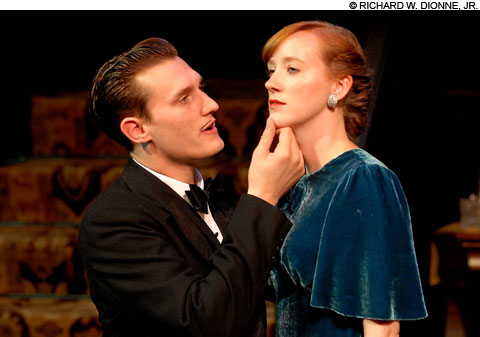
INNOCENCE LOST Church and Sheehan. |
The indoor equivalent to summertime beach reading is the stage melodrama. So 2nd Story Theatre is doing us the service, pitcher of lemonade not included, of letting us hiss and applaud at villains and their betters in Daphne du Maurier's Rebecca, directed by Mark Peckham (through July 29).
Perhaps you've seen the 1940 film version, Alfred Hitchcock's maiden American voyage into noirish thrills, which puts this production at a bit of a disadvantage: there will be few surprises around the turns of plot. Yet satisfactions abound, as the swirling passions fill flesh and blood characters, not black and white screen facsimiles.
Du Maurier adapted her popular novel of the same name into this play, so we can be assured that the story and its characters have been faithfully represented. With his late wife Rebecca dead 11 months, well-to-do widower Maxim de Winter (Jeff Church) has just returned from Monte Carlo to his estate in Cornwall, England, a fresh new wife meekly in tow. Played by Erin Sheehan, she is so much a non-entity in her own right that we know her throughout only as Mrs. de Winter. She has always been poor and with no family, a 21-year-old orphan who had been serving as a paid companion to a wealthy woman. De Winter makes clear that he selected her for her innocence, a blank slate upon which he can create the wife he desires.
But considering her impact on the story, the main character can be considered to be the housekeeper, Mrs. Danvers (Rae Mancini). She was more than devoted to Rebecca; she adored her, admiring that she let nothing stand in her way, which was such contrast a to her own powerless life as a servant. The former mistress of Manderley, the estate, drowned sailing the waters that the house overlooks. Her bedroom with its dramatic view of the sea is now kept by Mrs. Danvers as a shrine to Rebecca, and Mr. de Winter has taken up quarters on the opposite side of the mansion.
If there is any weakness to the lengthy establishing opening scene of this production, it is that the newlywed couple are presented in unmodulated single dimensions. When Maxim isn't furious at his bride for some minor infraction of his directions, he is seething with the potential to explode. When she isn't cowering in fear of making a mistake, she is timorously bleating about having done so. To some extent their heightened feelings are intentional, allowing the mutual anxiety to contrast nicely with the softened atmosphere of the relaxed second scene, when some time has passed and the couple are more comfortable with each other.
As Church and Sheehan nestle into their roles — he maintaining a pilot light of incipient anger and she keeping a wary eye for shifting emotional winds — Mancini keeps Mrs. Danvers pointed in the same direction, a reliable weathervane directed at the memory of Rebecca. Although her attitude toward the new Mrs. de Winter ranges from hostile indifference (not making eye contact when introducing herself) to outright antagonism (causing a rift between the couple by having her dress in a gown that Rebecca wore), Mancini doesn't turn her into a heartless villainess. She makes a monologue describing Mrs. Danvers's affection for her late mistress quite touching, actually.